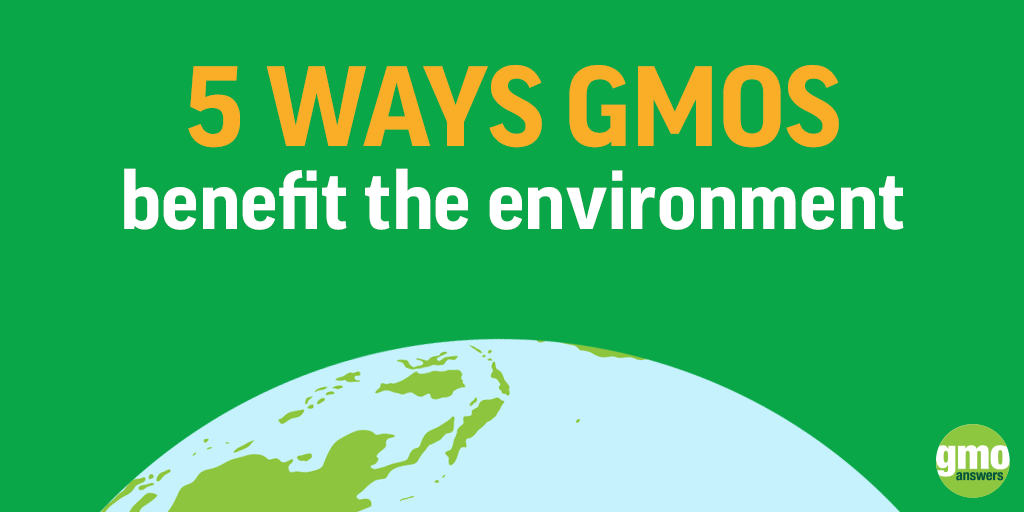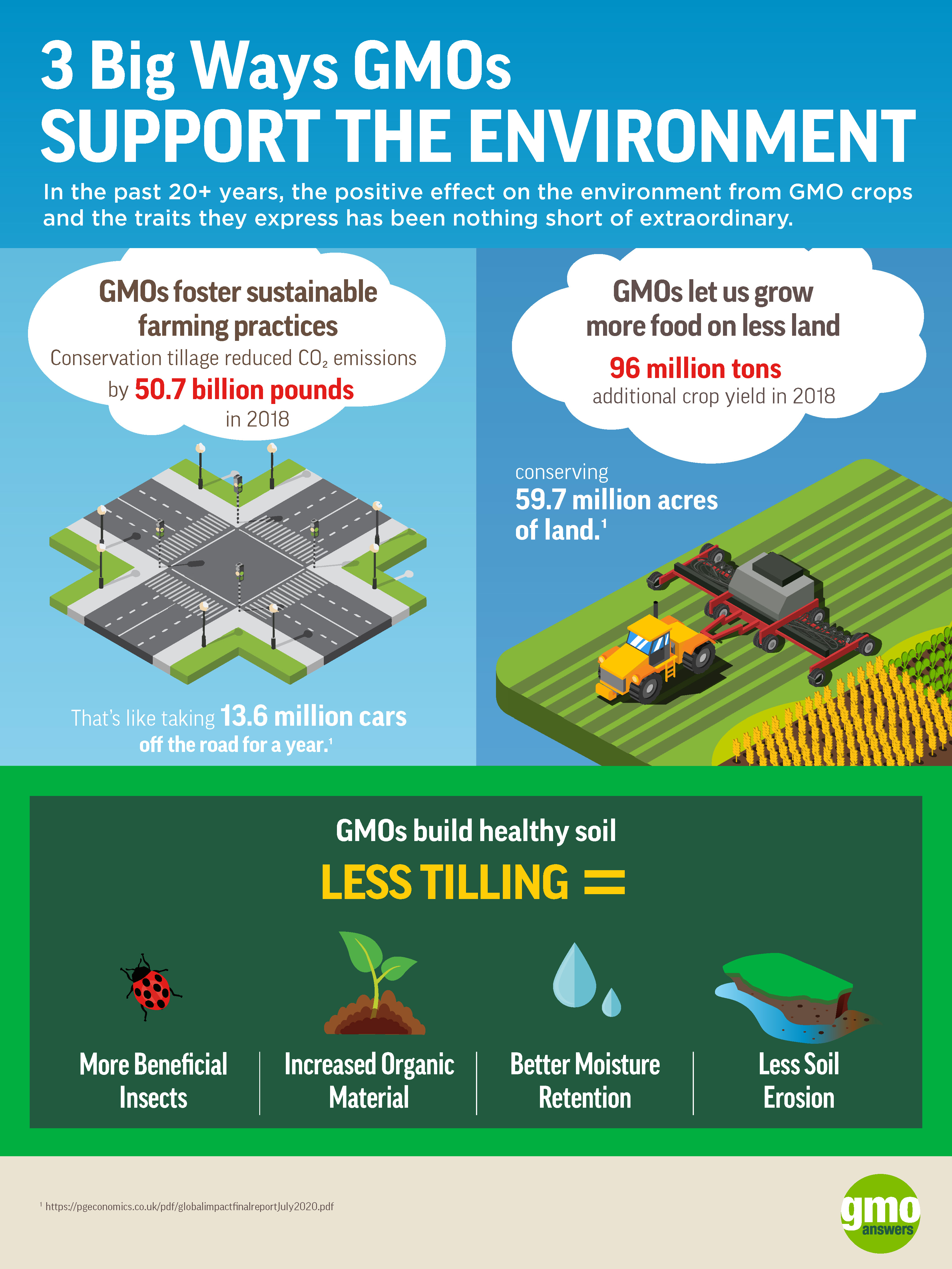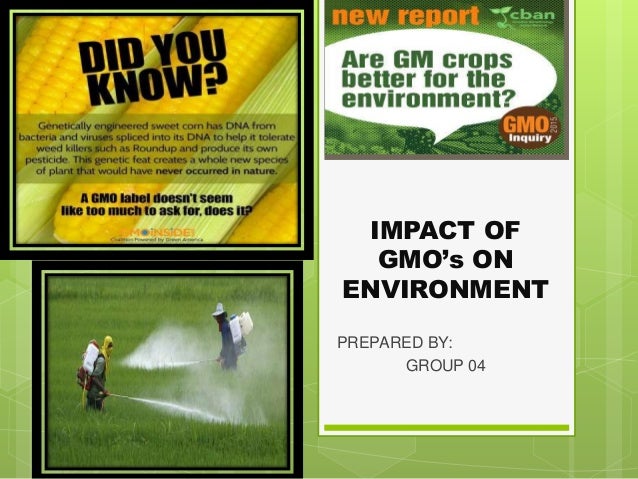Through the mass genetic modification of nature via GMO crops animals biopesticides and the mutated insects that are created as a result mega biotechnology corporations are threatening the overall genetic integrity of the environment as well as all of humankind. This lesson was designed as a follow-up to the Genetic Engineering lesson.
 Gmos Have Benefits For The Environment Bio
Gmos Have Benefits For The Environment Bio
To understand that environmental ethics is.

Gmos and the environment. To analyze the potential release of the introduced gene into the environment by unintended gene transfer the expression of the introduced gene. Engineers design plants using genetically modified organisms or GMOs to be tougher more nutritious or taste better. In my post I highlight some of the benefits of genetically modified crops to sustainability and the environment.
Genetically modified organisms GMOs although they provide many benefits to the economy and food supply are associated with numerous environmental implications. We recommend doing that activity before trying this one Vocabulary. However people have concerns over.
The GMO papaya called the Rainbow papaya is an example of a GMO crop developed to be resistant to a virus. GMOs and the Environment. Herbicide insecticide genetically modified organism pesticide refuge field resistance Prior Knowledge Questions Do these BEFORE.
Does that mean that they are using the land somehow too efficiently resulting in drawbacks for the environment. In some circumstances GMOs require less chemical use than organic crops to survive thus reducing affects of pollution and overall strain on the environment. GMOs help farmers make the best possible use of the land area used for farming.
GMOs can also be enhanced with more nutritional values and even vaccinations to improve life of consumers. It is possible that this saving could be passed onto the consumer. Genetically Modified Organisms Consumers Food Safety and the Environment.
Higher yields reduced pesticide use increased profits and reduced farm labour. Powerful tools provided by science and technology in recent years have had a profound impact on the food and agriculture sector worldwide. But there is more to biodiversity than just birds.
This summer we had some field days comparing GM and conventional corn. Once a plant is introduced in an agricultural environment it is reasonable to. GMOs are linked to a number of negative environmental effects and when an unnecessary process is harmful to the environment that generally makes it unsustainable.
What constitutes good or bad for the environment is an anthropocentric concern which squarely places these concerns with GMOs and GMFs in applied ethics. GMOs Affect on the Environment In todays growing society the majority of a communities concern is focused on food and how to provide a sufficient amount for ourselves. In contrast the conventional corn was essentially a.
The GM corn was teeming with beneficial animals lady bugs frogs spiders snails etc. Shortly put GMO crops have been found to increase farming efficiency. Bees can transport pesticides herbicides and DNA through the air into the environment.
A major advantage for over 18 million farmers globally who plant GMOs is the ability to successfully grow crops with fewer inputs including reduced pesticide applications and the fuel needed to operate tractors to till the soil. Genetically modified GM plants are the predominant largest class of GMOs introduced into the environment for food and feed production. Taken together studies have shown positive economic and environmental impacts.
Food and Agriculture Organization of the United Nations Rome 2001. Reduced Inputs Reduced inputs are one of the biggest environmental benefits of GMOs. As mentioned above most GMOs are designed to be resistant to herbicides namely glyphosate.
A major environmental concern associated with GM crops is their potential to create new weeds through out-crossing with wild relatives or simply by persisting in the wild themselves. GMOs and the Environment Note to teachers and students. In 2016 alone growing GMO crops helped decrease CO2 emissions equivalent to taking 167 million cars off the road for an entire year.
These are theorized to reduce production costs due to reduced chemical and mechanical needs in planting maintenance and harvest. Genetically Modified Organisms also known as GMOs help societys dramatic increase in population. There is a noticeable increase of food allergies mental and physical illnesses and disorders in recent years since the introduction of GMOs.
The potential for the above to happen is assessed prior to introduction and is.
 Organic Gmos Pamela Ronald And Raoul Adamchak On How Genetic Engineering Can Reduce Pesticide Use And Protect The Environment Genetic Literacy Project
Organic Gmos Pamela Ronald And Raoul Adamchak On How Genetic Engineering Can Reduce Pesticide Use And Protect The Environment Genetic Literacy Project
 The Environmental Impact Of Gmos One Green Planet
The Environmental Impact Of Gmos One Green Planet
 How Do Gmos Affect The Environment Gmo Answers
How Do Gmos Affect The Environment Gmo Answers
 Gmos Are Better For The Environment Than You D Think
Gmos Are Better For The Environment Than You D Think
 Gmos And The Environment Thoughtscapism
Gmos And The Environment Thoughtscapism
 Engineering An Environmental Disaster Earthjustice
Engineering An Environmental Disaster Earthjustice
 New Gizmo Gmos And The Environment Explorelearning News
New Gizmo Gmos And The Environment Explorelearning News
 Largest Ever Study Reveals Environmental Impact Of Genetically Modified Crops Uva Today
Largest Ever Study Reveals Environmental Impact Of Genetically Modified Crops Uva Today
 Can Gmos Help Protect The Environment Contrary To Myths About Gmos Hurting The Environment Gmos Allow Farmers To Preserve The Land While Doing More With Less
Can Gmos Help Protect The Environment Contrary To Myths About Gmos Hurting The Environment Gmos Allow Farmers To Preserve The Land While Doing More With Less
 How Do Gmos Affect The Environment Gmo Answers
How Do Gmos Affect The Environment Gmo Answers
 Gmos Top 3 Pros And Cons Procon Org
Gmos Top 3 Pros And Cons Procon Org
 Viewpoint Gmos Are Good For Farmers Consumers And The Environment Food Management
Viewpoint Gmos Are Good For Farmers Consumers And The Environment Food Management


Comments
Post a Comment